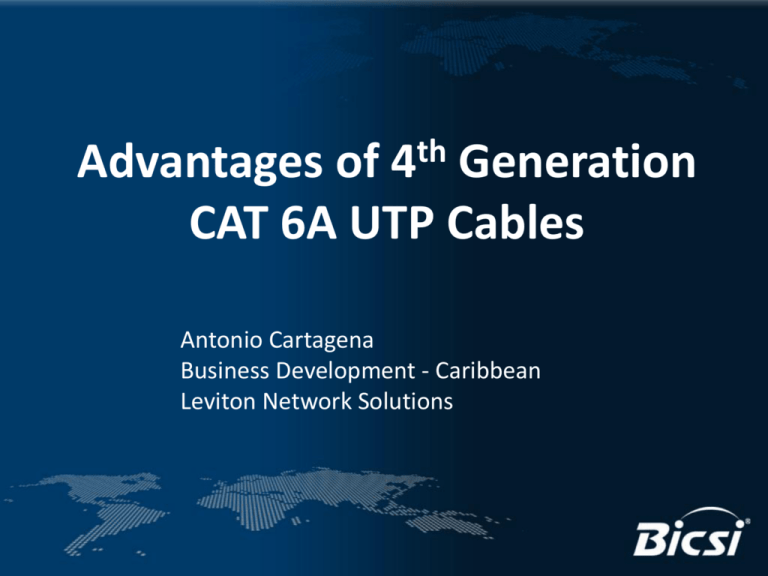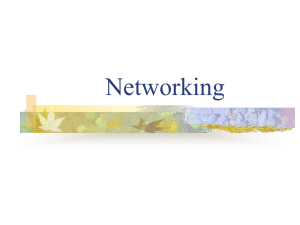
Advantages of 4th Generation
CAT 6A UTP Cables
Antonio Cartagena
Business Development - Caribbean
Leviton Network Solutions
Internet Protocol Bandwidth and Forecast:
2011-2016
• Global IP traffic will increase 3X over the next 5 years.
• Global mobile IP traffic will grow at a CAGR of 78%
• In 2016, the number of devices connected to IP
networks will be nearly 3X the global population.
• In 2016, every 3 minutes the gigabyte equivalent of all
movies every made will cross global IP networks.
• It would take over 6 million years to watch the amount
of video that will cross global IP network each month in
2016.
Source: Cisco Visual Networking Index, 2011-2016
Global Networking Trends
Cloud Computing
Big Data
Server Virtualization
IP Convergence
•
VoIP, PoE, IPTV, Building Automation,
Security over IP, FCoE
Unified Switch Fabric for Data/Storage
The ‘Internet of Things’
File Sizes / Video
Mobility
BYOD – increased devices
Social Media
eCommerce
Wireless jumps to 1G (802.3ac)
‘Nexus of Forces’ - Gartner
Source: Gartner ‘Nexus of Forces’, 2012
Applications Drive Need for Greater Bandwidth
Copper Technology - from Kb/s > Mb/s > Gb/s to multi-Gb/s applications
2012
40Gb/s (draft)
Performance
10Gb/s
1Gb/s
100 Mb/s
10Mb/s
Mb/s
Kb/s
10G (10GBase-T)
Gigabit Ethernet (1000Base-T)
Fast Ethernet (100Base-T)
ATM (155 Mb/s & 622 Mb/s)
CDDI (100Mb/s)
Token ring (4 and 16 Mb/s)
Ethernet, 10Base-T (10 Mb/s)
10Base-5 / 10Base-2 (10 Mb/s, coax)
Baseband video analog (8 MHz)
IBM 3270 (2.36 Mb/s)
EIA-232 (< 19.2 Kb/s)
Trends that impact structured cabling:
CAT 5e is considered legacy
CAT 6 growth rate is considered “standard” choice for projects
CAT 6A is growing rapidly to support 10GBase-T performance level migration
4
10/2/2013
Forecast for Ethernet Connection Speeds
X86 Servers by Ethernet Connection Speed
(2012 Forecast)
Based on IDC, Dell Oro, Crehan Research and Intel data from 2H’11 – 1Q’12
12
8
6
4
= 100Mbs
= 1 Gbps
= 10 Gbps
= 40 Gbps
2020
2019
2018
2017
2016
2015
2014
2013
2012
2011
2010
2009
2008
2007
2006
2005
2004
2003
2002
0
2001
2
2000
Millions of Server Units
10
= 100g
Three Stages for 10G PHY/Server Growth
90
3rd Stage
CREHAN RESEARCH Inc.
40GbE
Ports in Millions
Mainstream for Enterprise
2nd Stage
• Upgrade from 1GbE to 10GbE
• Largest port & revenue opportunity
• Majority PHY: 10GBASE-T
Mainstream for Public Cloud/Web
45
1St Stage
•
SFP+ (DAC) and Fiber
10G on backplane
•
•
0
2008
10GbE
10G Blade Servers
KX4, KR
2009
2010
2011
Total 10GbE server-class
Networking adoption curve
2012
2013
2014
2015
2016
1GbE
2017
Why 4th Generation CAT 6A
Cables?
Limitations Of Earlier CAT 6A Cables
Too large
• Most CAT 6A UTP cables have ODs in excess of 7.7mm
• Cables are relatively heavy
• 16% heavier than CAT 6A shielded cable
• Limits fill capacity in conduit and other cable pathways
• Blocks airflow from reaching critical active components
Higher frequencies create more issues with Alien
Crosstalk
Shielded solutions require grounding and bonding
• Increased costs for installation
• Potential issues with degraded bonds over time
8
10/2/2013
Evolution of CAT 6A Cable Outer Diameters
(25% more cables per tray, 20% smaller from Gen 1 and 14% more cables per tray, 11%
smaller from Gen 3)
25%
Fill
Ratio
9
Gen 1
9.07mm (100%)
Gen 2
8.90mm (2%)
240
246
264
300
CABLES
CABLES
CABLES
CABLES
Tray A
Tray A
Tray A
Tray A
10/2/2013
Gen 3
8.20mm (10%)
Gen 4
7.30mm (20%)
4th Generation CAT 6A UTP Cable
Design
Breaks in the material prevent current
from flowing along the length of the
cable
Isolation Wrap offers Substantial EMI protection
10
10/2/2013
4th Generation CAT 6A UTP Cable Design
4th Generation CAT 6A UTP utilizes same connectivity as other
UTP CAT 6A cables
• Termination of cable is just like U/UTP cable except for the
added step to nick and tear off isolation wrap
11
10/2/2013
Advantages of 4th Generation CAT 6A Cables
Smaller cable OD increases pathway density
More flexible makes it easier to route
Conduit Fill Advantages
• Pathway fill comparison (8.2mm to 7.3mm)
• Using TIA recommended fill guidelines
• 4 additional cables in a standard 2” (50mm conduit)
• 20% increase in fill
• Material savings of $2.67/foot going from 2.5” to 2” conduit
Cable Tray Fill Advantages
• 7 additional cables fit in a standard 4” wide X 2” deep
cable tray
• 29% increase
12
10/2/2013
Advantages of 4th Generation CAT 6A Cables
Pathway Cost Comparison
Cable Type
4th Generation - CAT
6A UTP
3rd Generation - CAT
6A UTP
Project Difference
13
10/2/2013
Cable OD
Number of
Cables
Pathway Space
Required (assuming
25% fill rate at
design)
Actual Tray Size Number of trays Cost per foot
Costs for
Project
7.3mm (0.287")
672
174 12X6 (30% fill)
2$
25.50 $ 10,200.00
8.2mm (0.323")
672
220 18X6 (26% fill)
2$
33.63 $ 13,452.00
$ (3,252.00)
Advantages of 4th Generation CAT 6A Cables
Conclusion
• New 4th generation CAT 6A solution offers up to 2-3%
project cost savings compared to existing CAT 6A UTP
solutions
14
10/2/2013
Additional Advantages of 4th Generation CAT 6A
Cables
Improved Alien Cross Talk performance compared to
previous solutions
• Discontinuous metallic elements within cable (sometimes
referred to as an isolation wrap) provide protection from
Alien Cross Talk
• They are not connected, so no path for current to flow, therefore do
not require grounding
• Designed and classified as UTP cabling systems
• Utilize UTP connectors
15
10/2/2013
Better Alien Crosstalk Performance
0.00E+00
-2.00E+01
PSANEXT dB
-4.00E+01
4th Gen Cable
-6.00E+01
U/UTP
F/UTP
Limit
-8.00E+01
-1.00E+02
-1.20E+02
1
10
100
Frequency
16
10/2/2013
1000
4th Generation CAT 6A UTP Versus Shielded Cable
Shielded solutions offer excellent Alien Crosstalk Performance,
but cost more for initial install
• Shielded components cost more
• Grounding and bonding drive up installation time and costs
Bonds can degrade over time, increasing total cost of ownership
Shielded cables are similar in cable OD, but are stiffer which makes
them more difficult to route
17
10/2/2013
4th Generation CAT 6A UTP Versus Shielded Cable
Conclusion
• Typical install of CAT 6A shielded solution can cost up to 3% more than
same install using 4th generation CAT 6A UTP cables
• No grounding and bonding required
• Eliminating grounding saves $2,760 in a
typical data center install
• Plus 50% faster to terminate UTP jacks
Total advantage = $11,400
18
10/2/2013
4th Generation CAT 6A UTP Versus
Shielded Cable
Termination Cost Comparison
Jack Costs
Time to
Terminate
Labor Rate
Cost to Terminate
Total
UTP Jack
13.58
0.0167 $
40.00 $
0.67 $ 82,060.80
Shielded Jack
14.42
0.0333 $
40.00 $
1.33 $ 90,739.20
Project Cost Difference
$ (8,678.40)
Grounding Analysis
Grounding Cost
each rack
Material
Hours
Labor Costs
Total Per Rack
UTP
$
5.00
0.1 $
4.00 $
9.00
Shielded
$
15.00
1$
40.00 $
55.00
Per rack difference
$
(46.00)
Project Cost Difference
$
(2,760.00)
19
10/2/2013
Preguntas?
Network Solutions
October 2, 2013
Gracias!
©2013 Leviton Manufacturing Company Inc. All Right Reserved
October 2, 2013
October 2, 2013
Leviton.com/ns






